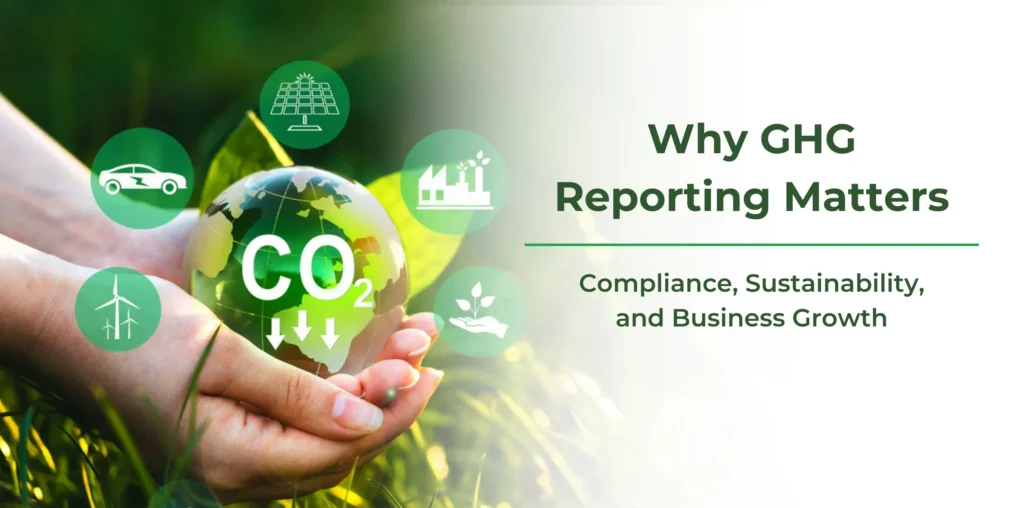EXPLORING THE BASICS OF GREENHOUSE GAS EMISSIONS

Greenhouse gases are gas compounds in the atmosphere that traps heat, that is known as the greenhouse effect. Natural occurrence of Greenhouse gases helps to make the planetary habitability. Greenhouse gases emitted by human activities, like burning of fuels, burning of farming, increases the amount of GHGs in the atmosphere, which increases Global warming by the greenhouse effect and ultimately that changes the climatic conditions and effects like extreme weather conditions, loss of biodiversity, health risks, natural calamities.
There are primary greenhouse gases to be aware of, each originating from different sources and possessing distinct characteristics and that gases adversely effect on environment.
- Carbon Dioxide:
Carbon dioxide is most abundant GHG emission gas, Carbon dioxide is mainly released form from burning fossil fuels such as coal, oil, and natural gas. Human activities that releases more Carbon dioxide in the atmosphere than the natural processes. In 2023, the average amount of CO2 in the atmosphere was 419.3 parts per million (ppm), which is a record high.
- Methane:
Methane is more effective in trapping heat in the atmosphere than Carbon dioxide. Main sources of methane emission are Fossil fuels used by human activity, Use of Bio-energy, Coal mines, use of oils, Extraction and processing of Natural gases, anthropogenic methane emissions by agriculture. In 2023, the energy sector emitted nearly 120 million metric tons (Mt) of methane.
- Nitrous Oxide:
Nitrous oxide is emitted by variety of sources in that from human activities like, agricultural activities such as use of nitrous fertilizer, burning of agricultural residues, Production of chemicals like nitric acid and adipic acid, Fuel combustion, by naturally it is emitted by soil, oceans, Plants. In 2023, the globally averaged concentration of nitrous oxide (N2O) was 336.7 parts per billion (ppb).
- Fluorinated gases
Fluorinated gases are also known as F-gases. The sources of Fluorinated gases are the use of hydrofluorocarbons (HFCs) in refrigeration and air conditioning systems, manufacturing of aluminum products and corresponding electronic products. This gas has very high potential in global warming.
Necessity of reduction in Greenhouse gases emission
- Climate Change Mitigation:
Reducing GHG emissions is essential to slowing down global warming that effect positively on environment and mitigating the severe effects of climate change, such as extreme weather events, rising sea levels, and disruptions to ecosystems and better climatic conditions.
- Health Benefits:
Lowering GHG emissions, particularly from fossil fuel combustion, can lead to cleaner air, reducing air pollution and improving public health by decreasing respiratory diseases, heart conditions, and premature deaths and clear environment also benefits to Biodiversity.
- Energy Efficiency:
Reducing emissions encourages the transition to renewable energy sources, which are not only cleaner but also more sustainable. This shift helps reduce dependence on finite fossil fuel resources, ensuring long-term energy security and reducing the global warming effect.
- Future Generations:
Reducing GHG emissions is necessary to ensure a livable planet for future generations. Sustainable practices today can help provide a healthier, more stable environment for tomorrow’s world.
- Global Cooperation:
The reduction of greenhouse gases requires collaborative efforts between governments, industries, and individuals. It encourages international partnerships for shared resources, innovation, and strategies to address climate change on a global scale.
- Biodiversity Preservation:
Reducing GHG emissions will help to protect ecosystem and biodiversity, as climate change leads to habitat destruction and threaten species with extinction due to change in weather patterns and ecosystems.
How to Minimize Greenhouse Gas Emissions: Actions to Take
- Transition to Renewable Energy:
Conversion of fuel sources from fossil fuels and other fuels that emits green house gas to renewable fuel sources such as solar, wind, hydro, which will effectively reduce the harmful emission from power generation.
- Encourage Waste Management:
Reduce, reuse, and recycle materials to minimize waste and reduce the need for new raw materials, which often involve significant emissions during extraction and production.
- Promote Forest Conservation and Reforestation:
Protection of forests, plantation of more trees will reduce the carbon dioxide and also helps in the reduction of global warming problem. Implement policies to reduce deforestation and support reforestation efforts worldwide.
- Raise Public Awareness and Education:
Educate communities, businesses, and individuals on the importance of reducing emissions and adopting sustainable practices. Encourage lifestyle changes such as reducing meat consumption, minimizing waste, and conserving water to lower personal carbon footprints.
- Government Policies and Incentives:
Enforce stricter emission standards and laws for industries, transportation, and energy production. Provide subsidies and tax incentives for businesses and individuals investing in clean energy solutions and low-emission technologies.
- Promote Sustainable Transportation:
Encourage to use of Electrical vehicle and also that rises the investment in EV. Promote public transportation, cycling, and walking over personal vehicle use to reduce emissions from cars. Invest in fuel alternatives, such as biofuels and hydrogen that will not helps in emission of greenhouse gas.
At PQSmitra, we provide comprehensive consultancy services to help businesses navigate the process of obtaining certifications for greenhouse gas (GHG) emissions management and sustainability. Our team of experts works closely with clients to measure, manage, and reduce their carbon footprint while ensuring adherence to international standards and regulations. We assist businesses in securing certifications for Carbon Footprint and other environmental certifications, enabling them to develop tailored strategies for reducing emissions, improving energy efficiency, and adopting renewable energy solutions. With our support, companies can enhance their environmental performance, demonstrate their commitment to sustainability, and contribute to global climate action.
Kindly submit a business inquiry online and we will get back to you!
OR
Call us on 022-2893 8687 | +91-9820204373
